最新仁爱版九年级英语上册第一单元知识点
仁爱版九年级上册英语Unit 1 Topic 1 知识点总结
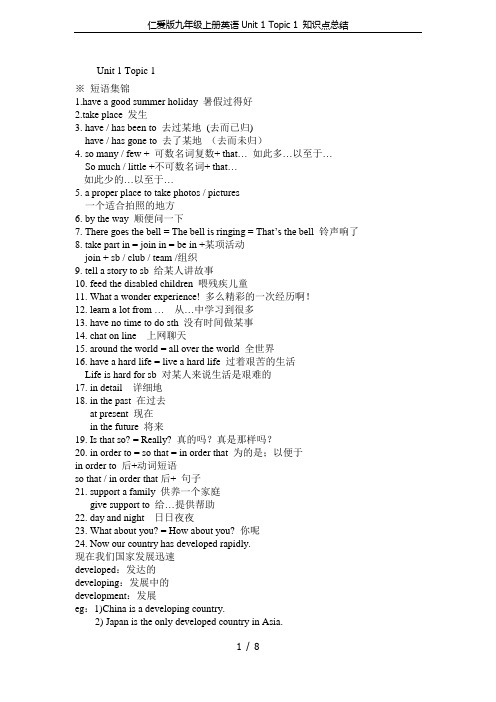
Unit 1 Topic 1※短语集锦1.have a good summer holiday 暑假过得好2.take place 发生3. have / has been to 去过某地(去而已归)have / has gone to 去了某地(去而未归)4. so many / few + 可数名词复数+ that… 如此多…以至于…So much / little +不可数名词+ that…如此少的…以至于…5. a proper place to take photos / pictures一个适合拍照的地方6. by the way 顺便问一下7. There goes the bell = The bell is ringing = That’s the bell 铃声响了8. take part in = join in = be in +某项活动join + sb / club / team /组织9. tell a story to sb 给某人讲故事10. feed the disabled children 喂残疾儿童11. What a wonder experience! 多么精彩的一次经历啊!12. learn a lot from … 从…中学习到很多13. have no time to do sth 没有时间做某事14. chat on line 上网聊天15. around the world = all over the world 全世界16. have a hard life = live a hard life 过着艰苦的生活Life is hard for sb 对某人来说生活是艰难的17. in detail 详细地18. in the past 在过去at present 现在in the future 将来19. Is that so? = Really? 真的吗?真是那样吗?20. in order to = so that = in order that 为的是;以便于in order to 后+动词短语so that / in order that后+ 句子21. support a family 供养一个家庭give support to 给…提供帮助22. day and night 日日夜夜23. What about you? = How about you? 你呢24. Now our country has developed rapidly.现在我们国家发展迅速developed:发达的developing:发展中的development:发展eg:1)China is a developing country.2) Japan is the only developed country in Asia.3) With the development of China, people’s living conditions become better andbetter.25. get / have / receive a good education 接受良好的教育26. have a balanced diet 均衡膳食27. more than = over 超过; 多余28. see … oneself 亲自看到29. in the 1968s 在二十世纪六十年代30. the living conditions 生活条件31. have a chance to do 有机会做某事32. keep in touch with 与某人保持联系get in touch with 与某人取得联系33. by letter or telegram 靠信件或电报34. things to choose from 供挑选的东西35. sorts of = kinds of 多种36. not only … but also … 不但….而且…37. Wha t’s more 而且38. make progress 取得进步make rapid progress 取得快速的进步make great progress 取得巨大的进步39. succeed in doing sth = be successfulin doing sth 成功做某事eg: Beijing succeeded in hosting the 29thOlympic Games in 2008. (同义句)= Beijing was successful in hosting the 29thOlympic Games.40. It’s important for sb to do sth 做…对某人是重要的41. dream about / of doing sth 梦想做某事42. watch a movie in the open air 看露天电影43. with the help of = with one’s help 在某人的帮助下44. draw up 拟定;起草45. thanks to … = because of 多亏;由于46.check over = look over 检查※精讲精析Section A1.have / has been to 去过某地(去而已归)与ever, never, before及次数等连用have / has gone to 去了某地(去而未归)have / has been in 表示在…已经多久了eg:用been, gone, in填空1)_ Where have you ?_ I have to a shopping center.2)_ Where is Maria?_ She has to Cuba.3)_ Has your mother ever there?_ No, she has never there.4)She has to England. She will come back in ten days.5)He has to Xian many times.6)He has been China for two years.7)How long have you been in this city?2. so ... that ... / such ... that ...都可意为如此...以至于...区别如下:1)so +形容词+ a / an + 单数名词= such + a / an + 形容词+ 单数名词eg:1) It is so moving a movie that all of us can’t help crying.(同义句)= It is such a moving movie that all of us can't help crying.2) It is so interesting a book that I read it again and again. (同义句)2) 如果名词是可数名词复数或不可数名词时这时只能用such , 不能用so3) 如果名词前有many , much , little, few时只能用so,不能用such.练习:用so / such 填空1) The boy is young that he can’t go to school.2) She told us a funny story that we all laughed.3) He has few books to read that he has to borrow some from the school library.4) It is a tall building that I can’t see its top.5) The old man is ill that he can’t get up.6) It was fine weather that we went swimming last weekend.7) They are small children that they can’t go to school.8) She speaks English well that the teacher praises(表扬)her.9) There is little bread that it is not enough for many people.10) It is delicious food that we all like it very much.3. There goes the bell.(同义句)= The bell is ringing.= That’s the bell.4.I want to work hard to make my English better.(同义句)= I want to work hard to improve myEnglish.注意:so ... that 句型的否定可与too ... to 句型和not enough ... to do 句型进行转换eg:1) Tom is so young that ha can’t go to school. (同义句)= Tom is too young to go to school.= Tom isn’t old enough to go to school.2)The desk is so heavy that I can’t move it. (同义句)= The desk is too heavy for me to move.= The desk isn’t light enough for me to move.3)The apple tree is so tall that we can’t reach it.(同义句)= The apple tree is too tall for us to reach.= The apple tree isn’t short enough for us to reac h.5.1) I have been to Beijing.(提问)Where have you been?2) Lily has been to Cuba.(提问)Where has lily been?3) My sister has gone to the gym.(提问)Where has your sister gone?4) They have gone to Shanghai.(提问)Where have they gone?Section B1.in a disabled children’s home在残疾儿童之家2.experience 在此处意为经历What a wonderful experience!一次多么棒的经历啊!experience还可意为经验讲,作经验讲时它是一个不可数名词eg: The teacher has a lot of teaching experience.这个老师有许多教学经验。
最新仁爱九年级上学期第一单元重点词组与句型归纳
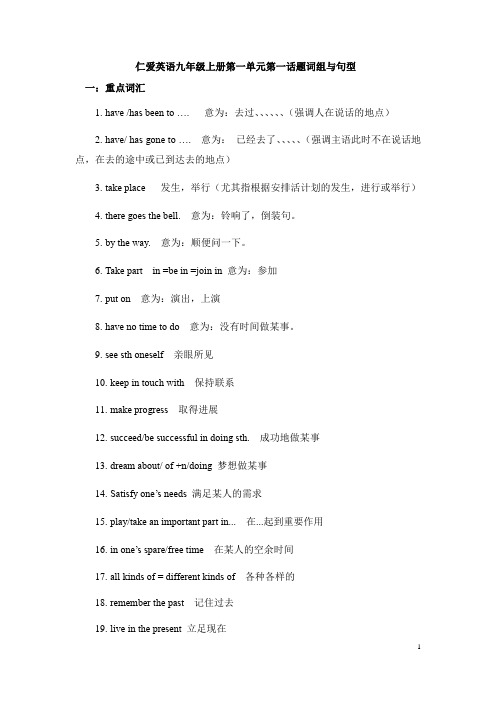
仁爱英语九年级上册第一单元第一话题词组与句型一:重点词汇1.have /has been to …. 意为:去过、、、、、、(强调人在说话的地点)2.have/ has gone to …. 意为:已经去了、、、、、(强调主语此时不在说话地点,在去的途中或已到达去的地点)3.take place 发生,举行(尤其指根据安排活计划的发生,进行或举行)4.there goes the bell. 意为:铃响了,倒装句。
5.by the way. 意为:顺便问一下。
6.Take part in =be in =join in 意为:参加7.put on 意为:演出,上演8.have no time to do 意为:没有时间做某事。
9.see sth oneself 亲眼所见10.keep in touch with 保持联系11.make progress 取得进展12.succeed/be successful in doing sth. 成功地做某事13.dream about/ of +n/doing 梦想做某事14.Satisfy one’s needs 满足某人的需求15.play/take an important part in... 在...起到重要作用16.in one’s spare/free time 在某人的空余时间17.all kinds of = different kinds of 各种各样的18.remember the past 记住过去19.live in the present 立足现在20.in the past 在过去21.at present 在如今22.at home and abroad 国内外二:重点句型1.Great changes have taken place there and my hometown has become moreand more beautiful.那儿已经发生了很大的变化,我的家乡已经变得越来越美了。
九年级上册英语笔记仁爱版
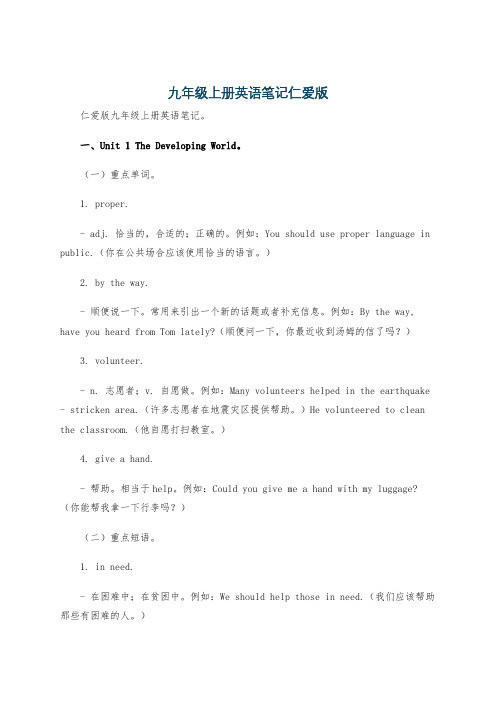
九年级上册英语笔记仁爱版仁爱版九年级上册英语笔记。
一、Unit 1 The Developing World。
(一)重点单词。
1. proper.- adj. 恰当的,合适的;正确的。
例如:You should use proper language in public.(你在公共场合应该使用恰当的语言。
)2. by the way.- 顺便说一下。
常用来引出一个新的话题或者补充信息。
例如:By the way, have you heard from Tom lately?(顺便问一下,你最近收到汤姆的信了吗?)3. volunteer.- n. 志愿者;v. 自愿做。
例如:Many volunteers helped in the earthquake - stricken area.(许多志愿者在地震灾区提供帮助。
)He volunteered to clean the classroom.(他自愿打扫教室。
)4. give a hand.- 帮助。
相当于help。
例如:Could you give me a hand with my luggage?(你能帮我拿一下行李吗?)(二)重点短语。
1. in need.- 在困难中;在贫困中。
例如:We should help those in need.(我们应该帮助那些有困难的人。
)2. come for a visit.- 来参观;来访问。
例如:My friends will come for a visit next week.(我的朋友们下周将来参观。
)(三)重点句型。
1. Have you come back from your hometown?- 这是一个现在完成时的一般疑问句。
其结构为“Have/Has+主语+过去分词+其他”。
回答可以是Yes, I have.或者No, I haven't.2. There goes the bell.- 这是一个倒装句。
九年级上册英语仁爱版知识点笔记

九年级上册英语仁爱版知识点笔记一、Unit 1 The Developing World。
1. 重点单词。
- develop:v. 发展;开发;冲洗(胶卷)。
例如:China has developed rapidly in recent years.(近年来中国发展迅速。
)- development:n. 发展;开发。
如:With the development of science and technology, our life has changed a great deal.(随着科学技术的发展,我们的生活发生了很大的变化。
)- feed:(fed,fed)v. 喂养;饲养。
例如:My mother feeds the dog every day.(我妈妈每天喂狗。
)- fair:- adj. 公平的;合理的。
如:It's fair to give everyone a chance.(给每个人一个机会是公平的。
)- n. 集市;展销会。
例如:There is a book fair in our city this weekend.(这个周末我们城市有一个书展。
)2. 重点短语。
- give a hand:帮忙。
例如:Could you give me a hand with my English?(你能帮我学英语吗?)- in need:在困难中;在贫困之中。
如:We should help those in need.(我们应该帮助那些有困难的人。
)- come to an end:结束。
例如:The meeting came to an end at 5 o'clock.(会议在5点结束。
)3. 重点句型。
- have/has been to与have/has gone to的区别。
- have/has been to表示“去过某地(人已经回来)”。
例如:I have been to Beijing twice.(我去过北京两次。
仁爱版九年级上册unit 1 topic 1 课文重点

仁爱版九年级 Unit 1 topic1 Topic1 A部分课文要点如下:①曾经去过....has been toShe has been to many places near her home in India,Her hometown has become more and more beautiful.She has been to Mount Huang with her parents,it's beautiful,but there were too many people.He has been to an English summer school to improve his English.②已经去了,还没回来 has gone toShe has gone to Cuba to be a volunteer and she will be back tomorrow.1、have been to +某地 “表示曾经去过,已经回来了,现在已不在那了”have gone to +某地 “表示去了某地,还没回来”have been in +某地 “表示待在某地”例:--Mum,where is dad?--He has gone to the supermarket.The Great Wall is a place of interest. All of us _____there before.A.have goneB.have beenC.have been to选B have been to there(× ) have been there(√)As an exchange student.(交换生)Tom _____Qiqihar for one and a half years.A.has been toB.has gone toC.has been in选 C .作为交换生,汤姆来齐齐哈尔已经1年半了。
仁爱版九年级上册第一单元Topic 1知识点
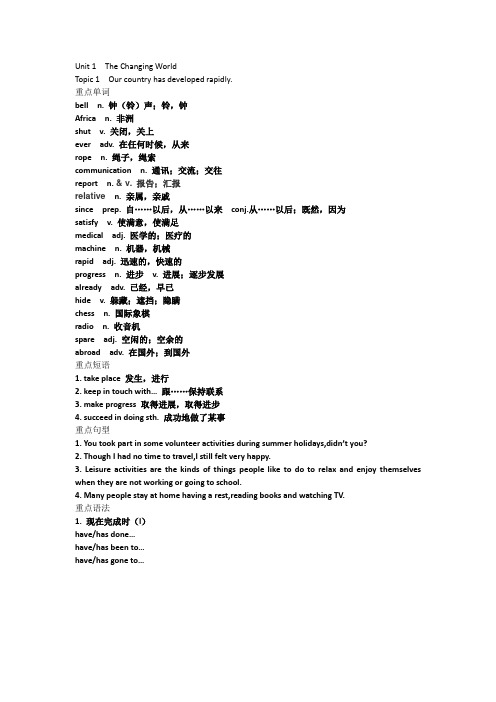
Unit 1The Changing WorldTopic 1Our country has developed rapidly.重点单词bell n. 钟(铃)声;铃,钟Africa n. 非洲shut v. 关闭,关上ever adv. 在任何时候,从来rope n. 绳子,绳索communication n. 通讯;交流;交往report n. & v. 报告;汇报relative n. 亲属,亲戚since prep. 自……以后,从……以来conj.从……以后;既然,因为satisfy v. 使满意,使满足medical adj. 医学的;医疗的machine n. 机器,机械rapid adj. 迅速的,快速的progress n. 进步v. 进展;逐步发展already adv. 已经,早已hide v. 躲藏;遮挡;隐瞒chess n. 国际象棋radio n. 收音机spare adj. 空闲的;空余的abroad adv. 在国外;到国外重点短语1. take place 发生,进行2. keep in touch with…跟……保持联系3. make progress 取得进展,取得进步4. succeed in doing sth. 成功地做了某事重点句型1. You took part in some volunteer activities during summer holidays,didn’t you?2. Though I had no time to travel,I still felt very happy.3. Leisure activities are the kinds of things people like to do to relax and enjoy themselves when they are not working or going to school.4. Many people stay at home having a rest,reading books and watching TV.重点语法1. 现在完成时(I)have/has done…have/has been to…have/has gone to…。
最新仁爱英语九上unit1知识点整理和归纳
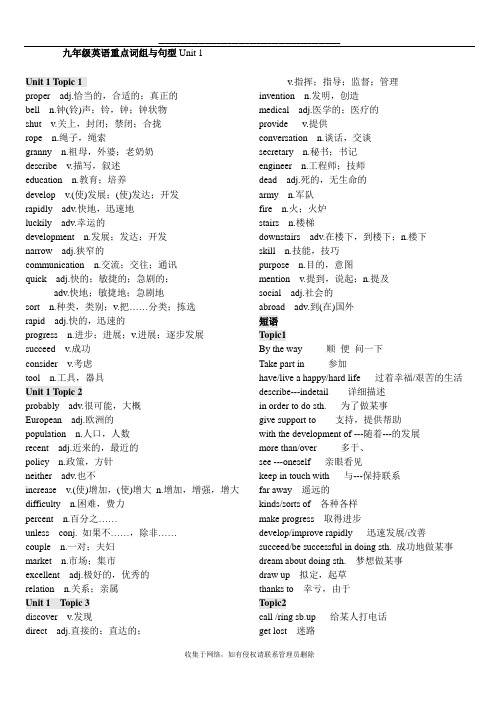
九年级英语重点词组与句型Unit 1Unit 1 Topic 1proper adj.恰当的,合适的;真正的bell n.钟(铃)声;铃,钟;钟状物shut v.关上,封闭;禁闭;合拢rope n.绳子,绳索granny n.祖母,外婆;老奶奶describe v.描写,叙述education n.教育;培养develop v.(使)发展;(使)发达;开发rapidly adv.快地,迅速地luckily adv.幸运的development n.发展;发达;开发narrow adj.狭窄的communication n.交流;交往;通讯quick adj.快的;敏捷的;急剧的;adv.快地;敏捷地;急剧地sort n.种类,类别;v.把……分类;拣选rapid adj.快的,迅速的progress n.进步;进展;v.进展;逐步发展succeed v.成功consider v.考虑tool n.工具,器具Unit 1 Topic 2probably adv.很可能,大概European adj.欧洲的population n.人口,人数recent adj.近来的,最近的policy n.政策,方针neither adv.也不increase v.(使)增加,(使)增大n.增加,增强,增大difficulty n.困难,费力percent n.百分之……unless conj. 如果不……,除非……couple n.一对;夫妇market n.市场;集市excellent adj.极好的,优秀的relation n.关系;亲属Unit 1 Topic 3discover v.发现direct adj.直接的;直达的;v.指挥;指导;监督;管理invention n.发明,创造medical adj.医学的;医疗的provide v.提供conversation n.谈话,交谈secretary n.秘书;书记engineer n.工程师;技师dead adj.死的,无生命的army n.军队fire n.火;火炉stairs n.楼梯downstairs adv.在楼下,到楼下;n.楼下skill n.技能,技巧purpose n.目的,意图mention v.提到,说起;n.提及social adj.社会的abroad adv.到(在)国外短语Topic1By the way 顺便问一下Take part in 参加have/live a happy/hard life 过着幸福/艰苦的生活describe---indetail 详细描述in order to do sth. 为了做某事give support to 支持,提供帮助with the development of ---随着---的发展more than/over 多于、see ---oneself 亲眼看见keep in touch with 与---保持联系far away 遥远的kinds/sorts of 各种各样make progress 取得进步develop/improve rapidly 迅速发展/改善succeed/be successful in doing sth. 成功地做某事dream about doing sth. 梦想做某事draw up 拟定,起草thanks to 幸亏,由于Topic2call /ring sb.up 给某人打电话get lost 迷路a couple of 一些,几个each other 互相at least 至少sth. happen to sb. 某人发生某事What happened to sb.某人发生某事?because of 因为,由于be strict with sb./in sth. 对某人/某事严格要求increase by 增加了--- increase to 增加到carry out 执行hundreds/thousands/millions/hundreds of成千上万/无数的/成百上千two thousand/million/hundred 两千/百万/百(具体数字后面不加s)be short of 短缺so far 到目前为止be known/famous for 因为---而闻名be known/famous as 作为---而闻名take measures to do sth. 采取措施做某事work well in doing sth.在---方面起到显著作用have a long way to go 有很长的路要走a town called --- 一个叫做---的镇fewer than/less than 少于a couple of 一些,几个place of interest 名胜古迹such as 例如such a/an+形容词+sb./sth .如此---的人/物take sb. to sp带某人去某地.keep up with 赶上belong to 属于Topic3used to do sth. 过去常常做某事be/get used to doing sth. 习惯做某事in fact/as a matter of fact 事实上come for a visit 来参观in need 在困难时decide on sth. 决定某事provide sth for sb./provide sb with sth.为某人提供某物feel good about oneself 自我感觉良好对---有信心lend sth. to sb/lend sb. sth. 把某物借给某人borrow sth. from sb向某人借某物buy sth. for sb. 给某人买某物at the same time 同时talk on the phone 在电话中交谈take drugs 吸毒pay for 付款at home and abroad 在国内外send sb. to sp. 送某人去某地aim to do sth. 目的是做某事How do you like---/What do you think of---?句子1.How was your trip? 你的旅行怎么样?3. There were so many people there that I couldn’tfind a proper place to take photos4.Listen! There goes the the bell听! 上课铃响了5.Though I had no time to travel, I still felt very happy. 虽然我没有时间去旅行,但是我仍然感到很开心have(no) chance/time to do sth. 有机会/时间做某事though,虽然,不与but连用6.Parents couldn’t afford education for their children. 父母供不起孩子上学。
最新仁爱版英语九年级上册Unit1 Topic1知识点 完整版

Unit1 Topic1 SectionA1.高兴做某事be happy/glad to do sth.2.现在完成时:①定义:强调已经发生或完成的动作对现在造成的影响或结果。
②构成:助动词have/has+动词的过去分词③八大时态:三“一”:一般现在时,一般过去时,一般将来时两“现”:现在进行时,现在完成时三“过”:过去进行时,过去完成时,过去将来时3.回来come back=be back=return4.发生:take place (有计划地发生)happen(偶然发生)①What happened to you?②happen to do sth.碰巧做某事(注意:发生没有被动语态)5.越来越美more and more beautiful越来越热hotter and hotter6.去过某地(已回来)have/has been to···去了某地(没回来,强调不在说话现场)have/has gone to···7.如此······以致于①so+形容词+that结果状语从句②such+名词+that结果状语从句(注意:当句中有many,much,few,little表示数量时,均用so)8.拍照take photos=take pictures9.顺便问一下by the way在去······的路上on the way to···挡道,妨碍in the way用这方式in this way10.铃响了. There goes the bell.=That’s the bell.=The bell is ringing.11.来come--came--come 变成become--became--become去go--went--gone 带走take--took--taken是be--was/were--beenUnit1 Topic1 SectionB1.现在完成时句式变化:肯定句:He has cleaned the room.否定句:He hasn’t cleaned the room.一般疑问句:Has he cleaned the room?肯定、否定回答:Yes,he has. / No,he hasn’t.特殊疑问句:What has he done?2.参加,加入①take part in=join in=be in(后跟活动)②join后跟组织,join sb.3.以···为食feed on=live on喂养feed---食物food流血bleed---血液blood4.看见see--saw--seen 喂养feed--fed--fed学习learn--learned/ learnt--learned/ learnt制作;使make--made--made拥有;吃;喝have--had--had感觉feel--felt--felt 放置put--put--put做,干do--did--done 飞,放飞fly--flew--flown阅读read--read--read 遇见meet--met--met5.experience①经历:可数名词②经验:不可数名词experienced为形容词“有经验的”6.感叹句有三种:①What+名词②How+形/副③How+句子How time flies!(注意:“时间,风,雨,雪,三餐,人口,成功”等虽然是不可数名词,但若前面有形容词修饰时,必须用a/an)7.使役动词make的用法:①make sb.+形容词②make sb.+职务名词(职务名词前不能加a/an/the)③make sb. do sth.8.别的,其他的other+复数名词=others9.任何别的any other+单数名词(同一范围内比较)10.虽然though不能与but连用,因为because不能与so连用.11.没有时间做某事have no time to do sth.no=not a / not any12.交朋友make friends with13.put on 穿上;上演;增加(体重)14.①动名词做主语,谓语动词用单三②动词不定式做主语,谓语动词用单三③不可数名词/单数名词做主语,谓语动词用单三④特殊疑问词做主语,谓语动词用单三⑤不定代词做主语,谓语动词用单三⑥one of +the+形容词最高级+复数名词,谓语动词用单三⑦主语从句做主语,谓语动词用单三Unit1 Topic1 SectionC1.在过去in the past 目前,现在at present2.采访;面试interview采访者;面试者interviewer 被采访者;被面试者interviewee3.超过,多于more than=over4.亲眼所见see sth. oneself=see sth. with one’s own eyes=5.在20世纪60年代:in the 1960s在1960年:in 19606.挤进···be crowded intocrowd(动词:挤名词:人群,观众)crowded:形容词7.足够的enough ①enough+名词②形/副+enoughHe is old enough to make enough money.他足够大能挣足够的钱了。
- 1、下载文档前请自行甄别文档内容的完整性,平台不提供额外的编辑、内容补充、找答案等附加服务。
- 2、"仅部分预览"的文档,不可在线预览部分如存在完整性等问题,可反馈申请退款(可完整预览的文档不适用该条件!)。
- 3、如文档侵犯您的权益,请联系客服反馈,我们会尽快为您处理(人工客服工作时间:9:00-18:30)。
U1U1T1SA1 You have just come back from you hometown.你刚从你的城镇回来。
现在完成时:之前已经发生或完成的动作对现在造成的影响或结果。
结构:助动词have/has +动词的过去分词I have finished that work. 我已经完成了那项工作。
She has bought a new bike. 她买了一辆新自行车。
2 have/has been to...去过……。
e.g. He has been to Hubei. 他去过湖北。
(人已不在湖北,表示有此经历,曾经去过那里。
)I have been to Beijing several times. 我去过北京几次。
have/has gone to...已经去了,它强调主语此时不在说话地点。
e.g. She has gone to Shang-hai. 她已经去了上海。
3 so...that... 如此……以至于……,引导结果状语从句。
e.g. He ran so quickly that we couldn’t keep up with him.,他跑的太快以至于我们都赶不上。
so...that...引导的从句有时可以和too...to...句型互换。
e.g. He is so young that he can’t go to school. = He is too young to go to school. 他太小了,还不能上学。
4 improve 意为“提高,(使)好转,,改善”。
a.可作及物动词。
improve oneself自我提高。
e.g. He has improved his health. 他的健康状况得到了改善。
b.可作不及物动词。
e.g. His health is improving. 他的健康状况正在好转。
另:improve on/upon sth.对……做出改进。
e.g. He has improved on the invention.他进一步完善了他的发明。
improvement n. 改进(处),增进,事物。
5 by the way 顺便问一问。
e.g. By the way, do you know him? 顺便问一问,你认识他吗?6 There goes the bell.=That’s the bell.=The bell is ringing.铃响了。
此句是倒装语序。
倒装分为局部倒装和完全倒装,主语是代词时一般用局部倒装,主语是名词时则用完全倒装。
e.g. There comes the bus. 公共汽车来了。
Look! Here he comes. 看!他来了。
Here you are. 给你。
8 Where have you been? 你去过哪里啦?I have been to +地点。
我去过了……Where has she/he been? 她/他去过哪里啦?She/He has been to +地点。
我去过了。
U1T1SB1 I haven’t seen you for a long time.我很长时间没看到你啦。
现在完成时的否定结构是haven’t/hasn’t+过去分词。
2You took part in some volunteer activities during summer holidays, didn’t you? 你在暑假参加了一些志愿者活动,是吗?此句为反义疑问句。
例如:e.g. It’s a nice day, isn’t it?美好的一天,不是吗?Ann didn’t use to live there, did she?Ann过去不常住那里,不是吗?3 I’ve learnt a lot from it. 我从中学到了很多东西。
learn ... from... 从……中学习(到)……。
e.g. We must learn from each other.我们必须互相学习。
He learnt a lot from his friends last summer.去年夏季,他从他朋友那学到了很多。
4 Have you been to any other place?你有没有去过其它地方吗?现在完成时的疑问句?Have you cleaned the room?回答:Yes, I have, /No , I haven’t .5 Though I had no time to travel, I still felt very happy.虽然我没有时间去旅行,但是我仍然觉得很开心。
A though conj. 尽管,虽然,引导让步状语从句。
注意:though不能与but连用。
e.g. Though it was late, he went on working.尽管天晚了,但他仍在工作。
B have (no) time to do sth. 意为“有(没有)时间做……”。
e.g. I have time to see you. 我有时间去看你。
U1T1SC1 more than 相当于over,意为“超过,多于”,后常跟数词。
more than/over ten men 十多个人。
more ... than ... 意为“比……更……”,是比较级的一种用法。
中间多接名词、多音节的形容词或副词原级。
e.g. I have more friends than you. 我的朋友比你的多。
He is more careful than Jim. 他比吉姆细心。
2 see sth. oneself 意为“亲眼目睹”。
e.g. I saw him helping others myself. 我亲眼目睹他帮助别人。
3 have the chance to do sth. 意为“有机会做某事”。
e.g. I’ll have the chance to visit your factory next Sunday.下星期天我将有机会去参观你们的工厂。
4 a.keep in touch with ... 意为“与……保持联系”。
e.g. He still keeps in touch with his old friends.他仍和老朋友们保持联系。
b.far away遥远,常放在句末作后置定语。
e.g. They live in a village far away.他们住在一个遥远的村子里。
faraway adj. 遥远的e.g. a faraway town 一个遥远的小镇far away from+某地,离……遥远。
如前面有具体数字时,则不能连用far。
e.g. My home is far away from Beijing. 我家离北京很远。
My hometown is about 100 kilometers away from Shanghai.我的家乡离上海大约100公里。
5 develop v.发展,发达。
developed adj. 发达的,developing adj. 发展中的,development n.发展。
e.g. China’s economy has developed a lot, but Chin a is still a developing country while the U.S.A. is a developed country. 中国的经济已经有了很大的发展,但中国仍是一个发展中国家,而美国是一个发达国家6 satisfy v.使(某人)满意或满足。
e.g. It’s impossible to satisfy everyone.让所有的人满意是不可能的。
be satisfied with ...意为“对……感到满意、满足”,与be pleased with...同义。
e.g. He is satisfied with his new job.他对他的新工作感到满意。
7 not only...but also... 不但……而且……,用来连接两个相同的成分。
连接主语时,谓语动词须和邻近的主语保持一致。
e.g. Not only he but also I have been to Canada.不仅他去过加拿大,我也去过。
8 care n.照料、照顾、护理。
medical care 医疗保健patient care 病人护理take care of (sb./sth.) 照料、照顾(某人/某物)v. care about sb./sth.关注、在意、担忧某人/某物e.g. I don’t care about what she said.我不在意她所说的。
9 a. already adv. 意为“已经”,多用于现在完成时,常放在肯定句中间或句末。
e.g. I have already read this book. 我已经看过这本书了。
b. succeed in sth./doing sth.意为“成功地做某事”。
e.g. Tom succeeded in making a beautiful model plane.汤姆成功地做好了一个漂亮的飞机模型。
Success n. 成功。
successful adj. 成功的。
10 I think it’s important to remember the past.我认为记住过去很重要。
a. it 是形式主语,动词不定式作真正的主语。
e.g. I find it is easy for us to learn English well.我发现对我们来说学好英语是容易的。
11. dream about 梦想,展望,后接名词或动词-ing形式。
e.g. He dreams about a new house.他梦想拥有一栋新房子。
We used to dream about living abroad.过去我们常常梦想去国外生活。
U1T1SD1. Leisure activities play an important part in people’s lives. 休闲活动在人们的生活中起着重要的作用。
play a/an…part = play a/an…role扮演……角色;起……作用;有……影响e.g. Computer plays an important part in ourdaily lives.2. Watching operas and listening to the radio were the main activities in theirspare time.看戏和听广播是他们在空闲时间的主要活动。
